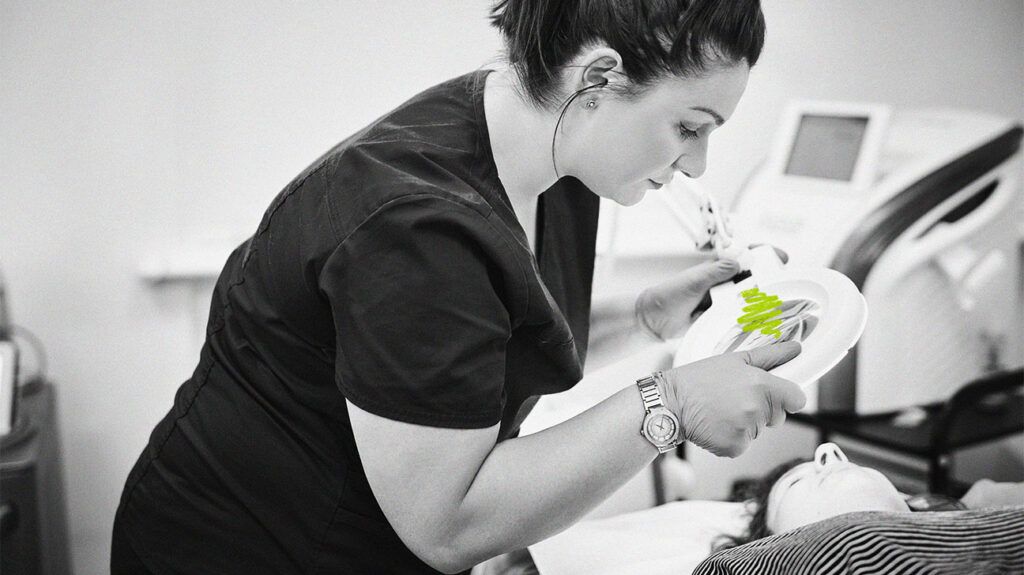Laser therapy is a noninvasive procedure that uses UV light to help reduce eczema symptoms. It may be suitable when eczema is moderate or severe — which affects a substantial portion of the body — or when other therapies have been ineffective.
Eczema is a chronic skin condition involving inflammation and itching. While there are various treatment options available, ranging from topical creams to oral medications, some individuals seek alternative therapies to ease their eczema symptoms. One such option is laser treatment for eczema.
This article will explore what laser treatment for eczema is, including how it works, its effectiveness, and treatment duration. It will also discuss where on the body the technique can treat, cost considerations, and its role in addressing eczema scars.

Laser treatment for eczema — also known as phototherapy — is a safe and noninvasive medical procedure that uses different wavelengths of UV light to manage eczema symptoms. This approach aims to ease itching, inflammation, and redness.
According to the National Eczema Association, a dermatologist may recommend laser therapy if eczema symptoms persist after undergoing other forms of treatment.
The
Another laser type is the excimer laser, which also uses UVB to treat affected skin.
Laser therapy for eczema involves using a specialized device that emits targeted, high intensity light. Depending on the device type, a healthcare professional directs light at the affected skin areas, usually for a few seconds to minutes.
A dermatologist carefully chooses the wavelength of the laser light to penetrate the skin’s surface and reach the underlying tissues. Once the light energy reaches these tissues, it interacts with the immune cells — such as mast cells or T-cell lymphocytes — responsible for triggering inflammation in eczema.
Only qualified healthcare professionals, such as dermatologists, should administer laser treatment for eczema. Sessions typically take place in hospitals or specialized skin clinics.
Qualified healthcare professionals can also determine if laser therapy is suitable and provide proper guidance on where to go for treatment.
The results from laser treatment can vary from person to person. Some individuals experience significant relief from their symptoms, including reduced itching, redness or discoloration, and inflammation. However, it is essential to understand that not everyone may respond equally well to this treatment.
The effectiveness of eczema laser therapy can depend on many factors, including:
- laser type
- the chosen wavelength
- the individual’s specific eczema type
- severity of eczema
Therefore, consulting with a dermatologist or healthcare professional who can assess a person’s unique situation and provide personalized advice is crucial. They can also provide details on the results to expect.
Eczema can affect various body parts, and lasers can treat most of them. It may be particularly effective for large areas of the body.
Common body parts that laser may treat include:
- face
- neck
- arms
- hands
- legs
- torso
It is important to discuss the specific affected areas a person wants to treat with a healthcare professional. This is because they will help determine the most appropriate approach and target those areas during sessions.
The length of laser treatment for eczema can vary depending on the individual’s condition and the treatment plan that the dermatologist devises. Most people require ongoing treatment and multiple sessions.
Phototherapy may improve the skin gradually after several weeks of regular treatment. Dermatologists usually administer two to three times weekly for around 12–16 weeks. The skin may receive exposure to the laser initially for 30 seconds, building up to a maximum of around 15 minutes.
In addition to managing active eczema symptoms, laser therapy can also play a role in addressing eczema scars. Eczema can scar the skin due to prolonged inflammation and scratching.
Laser treatment can reduce the appearance of these scars by promoting collagen production and skin regeneration, leading to improved skin texture and tone. Treating scars can boost self-confidence and improve the overall appearance of the affected areas.
The cost of laser treatment for eczema can vary widely depending on several factors, including:
- laser type
- the location of the clinic
- the number of sessions
A person can speak with a healthcare professional and medical insurance company to understand the potential costs of laser therapy and explore what options may be available, particularly if doctors deem the treatment medically necessary.
Learn more about whether Medicare covers eczema costs.
Laser treatment for eczema is an innovative approach that offers potential relief for individuals with this challenging skin condition. By using focused light energy, this therapy aims to reduce inflammation, itching, and redness or discoloration, which are common symptoms of eczema.
The effectiveness of laser treatment can vary from person to person, as do treatment duration and costs. If a person is considering laser treatment for eczema, it is vital to consult with a qualified healthcare professional to assess specific needs and determine the best course of action.
It is important to have realistic expectations about the potential outcomes. While laser therapy can be a valuable tool in managing eczema symptoms and scars, it may not be effective for everyone.
